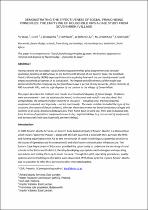 ResearchSpace
ResearchSpace
Demonstrating the effectiveness of social franchising principles: The emptying of household vips: A case study from Goven Mbeki village
JavaScript is disabled for your browser. Some features of this site may not work without it.
- ResearchSpace
- →
- Research Publications/Outputs
- →
- Conference Publications
- →
- View Item
| dc.contributor.author |
Wall, K

|
|
| dc.contributor.author |
Ive, O

|
|
| dc.contributor.author |
Bhagwan, J

|
|
| dc.contributor.author |
Kirwan, F

|
|
| dc.contributor.author |
Birkholtz, W

|
|
| dc.contributor.author |
Lupuwana, N

|
|
| dc.contributor.author |
Shaylor, E

|
|
| dc.date.accessioned | 2013-03-19T07:29:07Z | |
| dc.date.available | 2013-03-19T07:29:07Z | |
| dc.date.issued | 2012-10 | |
| dc.identifier.citation | Wall, K, Ive, O, Bhagwan, J, Kirwan, F, Birkholtz, W, Lupuwana, N and Shaylor, E. 2012. Demonstrating the effectiveness of social franchising principles: The emptying of household vips: A case study from Goven Mbeki village. Faecal Sludge Management, Durban, October 2012 | en_US |
| dc.identifier.uri | http://www.pid.co.za/index.php/fsm2-conference | |
| dc.identifier.uri | http://hdl.handle.net/10204/6577 | |
| dc.description | Faecal Sludge Management, Durban, October 2012 | en_US |
| dc.description.abstract | Having viewed the successful social franchising partnerships pilot programme that serviced sanitation facilities at 400 schools in the Butterworth District of the Eastern Cape, the Amathole District Municipality (ADM) expressed interest in exploring how well the partnership model could empty household pit latrines in its jurisdiction. The impact and effectiveness of the model was demonstrated by the emptying, by five franchisees over a period of only six weeks, of the contents of 400 household VIPs, and the safe disposal of the content in the village of Goven Mbeki. The paper describes the methods and results in removal and disposal of faecal sludge. Problems were encountered - and the solutions (technical, institutional and social) - are described. Not unexpectedly, the amount of effort involved in this work - including time, training required, equipment required, and ingenuity - varied enormously. The main variables included the type of top structure, the nature of the pit contents, whether there was or was not broad consistency of type and contents in an area, distances (between pits, from home base to work site, from pits to disposal site, from location of specialised equipment to work site), logistical delays (e.g. non arrival of equipment), and bureaucratic hold-ups (especially payment delays). | en_US |
| dc.language.iso | en | en_US |
| dc.publisher | Partners in Development | en_US |
| dc.relation.ispartofseries | Workflow;10191 | |
| dc.subject | Faecal sludge | en_US |
| dc.subject | Faecal sludge disposal | en_US |
| dc.subject | School sanitation facilities | en_US |
| dc.subject | Amathole District Municipality | en_US |
| dc.title | Demonstrating the effectiveness of social franchising principles: The emptying of household vips: A case study from Goven Mbeki village | en_US |
| dc.type | Conference Presentation | en_US |
| dc.identifier.apacitation | Wall, K., Ive, O., Bhagwan, J., Kirwan, F., Birkholtz, W., Lupuwana, N., & Shaylor, E. (2012). Demonstrating the effectiveness of social franchising principles: The emptying of household vips: A case study from Goven Mbeki village. Partners in Development. http://hdl.handle.net/10204/6577 | en_ZA |
| dc.identifier.chicagocitation | Wall, K, O Ive, J Bhagwan, F Kirwan, W Birkholtz, N Lupuwana, and E Shaylor. "Demonstrating the effectiveness of social franchising principles: The emptying of household vips: A case study from Goven Mbeki village." (2012): http://hdl.handle.net/10204/6577 | en_ZA |
| dc.identifier.vancouvercitation | Wall K, Ive O, Bhagwan J, Kirwan F, Birkholtz W, Lupuwana N, et al, Demonstrating the effectiveness of social franchising principles: The emptying of household vips: A case study from Goven Mbeki village; Partners in Development; 2012. http://hdl.handle.net/10204/6577 . | en_ZA |
| dc.identifier.ris | TY - Conference Presentation AU - Wall, K AU - Ive, O AU - Bhagwan, J AU - Kirwan, F AU - Birkholtz, W AU - Lupuwana, N AU - Shaylor, E AB - Having viewed the successful social franchising partnerships pilot programme that serviced sanitation facilities at 400 schools in the Butterworth District of the Eastern Cape, the Amathole District Municipality (ADM) expressed interest in exploring how well the partnership model could empty household pit latrines in its jurisdiction. The impact and effectiveness of the model was demonstrated by the emptying, by five franchisees over a period of only six weeks, of the contents of 400 household VIPs, and the safe disposal of the content in the village of Goven Mbeki. The paper describes the methods and results in removal and disposal of faecal sludge. Problems were encountered - and the solutions (technical, institutional and social) - are described. Not unexpectedly, the amount of effort involved in this work - including time, training required, equipment required, and ingenuity - varied enormously. The main variables included the type of top structure, the nature of the pit contents, whether there was or was not broad consistency of type and contents in an area, distances (between pits, from home base to work site, from pits to disposal site, from location of specialised equipment to work site), logistical delays (e.g. non arrival of equipment), and bureaucratic hold-ups (especially payment delays). DA - 2012-10 DB - ResearchSpace DP - CSIR KW - Faecal sludge KW - Faecal sludge disposal KW - School sanitation facilities KW - Amathole District Municipality LK - https://researchspace.csir.co.za PY - 2012 T1 - Demonstrating the effectiveness of social franchising principles: The emptying of household vips: A case study from Goven Mbeki village TI - Demonstrating the effectiveness of social franchising principles: The emptying of household vips: A case study from Goven Mbeki village UR - http://hdl.handle.net/10204/6577 ER - | en_ZA |





